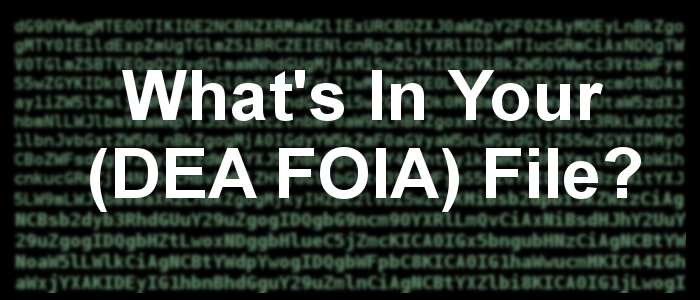A couple of months ago, I filed a FOIA request with the DEA, for their user manuals and training materials, relating to the NSA’s ICREACH query system. DEA conducted a search, and concluded that the agency possessed no responsive documents. Afterwards, I did what any good FOIA requester would do — I filed a FOIA request for the administrative records generated by my previous FOIA request. (Yes, one can do such a thing, and its a fairly common practice.)
November 8, 2014
Freedom of Information & Privacy Act Unit
Drug Enforcement Administration
8701 Morrissette Drive
Springfield, VA 22152
Dear FOIA Officer:
Under the Freedom of Information Act, I am requesting a copy of the following records:
Administrative records generated during the processing of FOIA request 14-00701-F.
If there are any fees for searching for, reviewing, or copying the records, please notify me before processing if the amount exceeds $10.00.
I am making this request for personal, non-commercial use.
If you deny all or any part of this request, please cite each specific exemption you think justifies your refusal to release the information and notify me of appeal procedures available under the law.
If possible, I would prefer to receive responsive documents in electronic form, as .pdf files emailed to steve@….
Thanks for your time and attention.
DEA responded with a 20-page dossier on the handling of FOIA request 14-00701-F. I was surprised to see the process documented in such detail, and I think it says a few things about DEA as an organization.
First, DEA’s record keeping is impeccable, right down to scanning the envelope that contained my original FOIA request.
Second, DEA seems to take FOIA requests very seriously. For example, each divisional search that DEA tasked was accompanied by a cover page. The cover page stated “The FOI/PA requires that a request must be responded to within 20 working days from receipt. Therefore, if assistance is requested by SARF in locating or duplicating DEA documents, it is imperative that this request be given immediate priority and not treated in a routine fashion”. All I can say is “wow”, especially given my experience with some of the other federal agencies out there.
Now, let’s look at what DEA did with my original request. Their FOIA office tasked searches to three units with DEA: the Intelligence Division, the Office of Training, and the Special Operations division. I can see the amount of time that each division spent conducting their records search: 30 minutes from “OM”, 1 hour 45 minutes from Training, and another 30 minutes from “OS”.
Through the administrative records, I can even establish a timeline of how my request was handled.
- 8/30/2014. FOIA request written
- 9/2/2014. FOIA request postmarked
- 9/11/2014. FOIA request date-stamped by DEA
- 9/15/2014. DEA sends written acknowledgment of FOIA request
- 10/1/2014. DEA’s FOIA office tasks out two intra-agency searches
- 10/2/2014. DEA’s FOIA office tasks out a third intra-agency search
- 10/6 – 10/15/2014. Three DEA divisions perform records searches, and submit responses to the FOIA office.
- 10/31/2014. DEA’s FOIA office composes a response to my FOIA request
- 11/8/2014. I take delivery of DEA’s response. (DEA sent their FOIA response via Registered Mail, return receipt. The return receipt was signed on Nov 8th).
- 11/14/2014. DEA receives the return receipt.
That is the 2.5 month journey of my request for ICREACH documentation possessed by DEA. As I said before, I’m impressed with DEA’s response, and with their detail-oriented record keeping.
The FBI and TSA should look to DEA as a role model of FOIA processing. Especially the TSA.
Documents: DEA FOIA Response.


A couple of months ago, I filed a FOIA request with the DEA, for their user manuals and training materials, relating to the NSA’s ICREACH query system. DEA conducted a search, and concluded that the agency possessed no responsive documents. Afterwards, I did what any good FOIA requester would do — I filed a FOIA request for the administrative records generated by my previous FOIA request. (Yes, one can do such a thing, and its a fairly common practice.)
DEA responded with a 20-page dossier on the handling of FOIA request 14-00701-F. I was surprised to see the process documented in such detail, and I think it says a few things about DEA as an organization.
First, DEA’s record keeping is impeccable, right down to scanning the envelope that contained my original FOIA request.
Second, DEA seems to take FOIA requests very seriously. For example, each divisional search that DEA tasked was accompanied by a cover page. The cover page stated “The FOI/PA requires that a request must be responded to within 20 working days from receipt. Therefore, if assistance is requested by SARF in locating or duplicating DEA documents, it is imperative that this request be given immediate priority and not treated in a routine fashion”. All I can say is “wow”, especially given my experience with some of the other federal agencies out there.
Now, let’s look at what DEA did with my original request. Their FOIA office tasked searches to three units with DEA: the Intelligence Division, the Office of Training, and the Special Operations division. I can see the amount of time that each division spent conducting their records search: 30 minutes from “OM”, 1 hour 45 minutes from Training, and another 30 minutes from “OS”.
Through the administrative records, I can even establish a timeline of how my request was handled.
That is the 2.5 month journey of my request for ICREACH documentation possessed by DEA. As I said before, I’m impressed with DEA’s response, and with their detail-oriented record keeping.
The FBI and TSA should look to DEA as a role model of FOIA processing. Especially the TSA.
Documents: DEA FOIA Response.